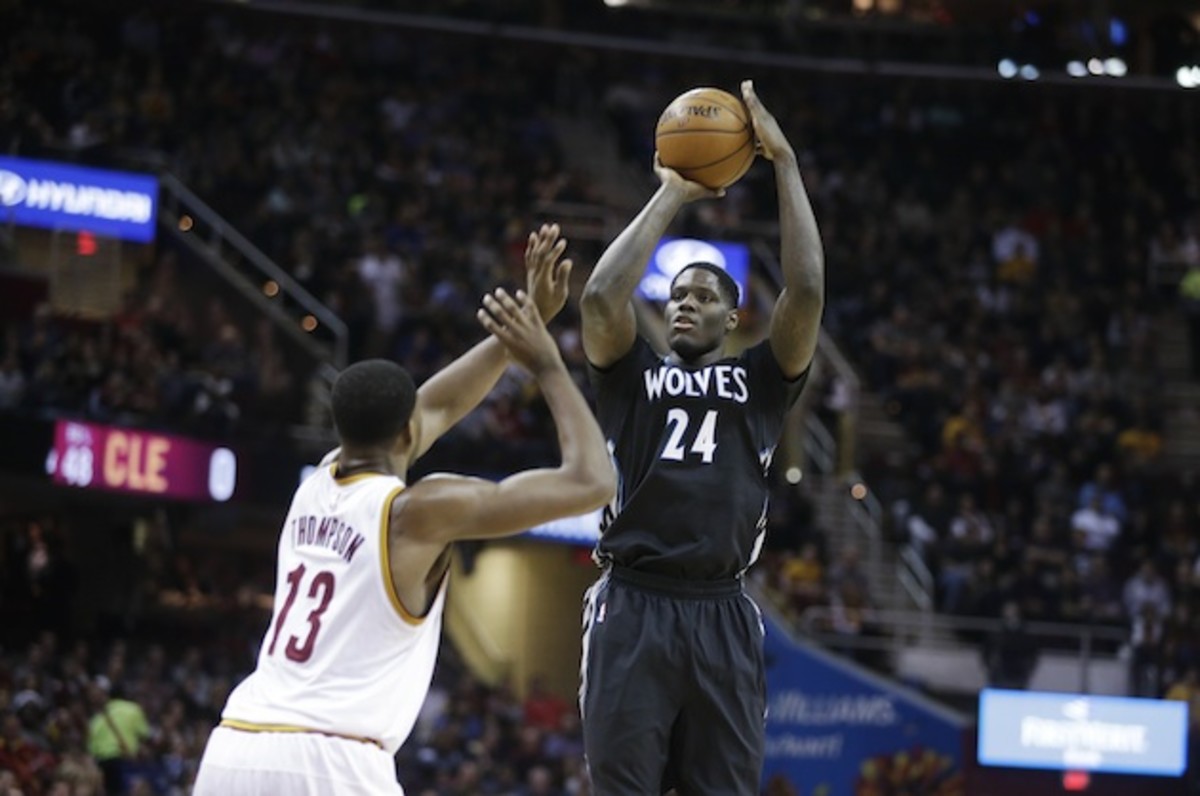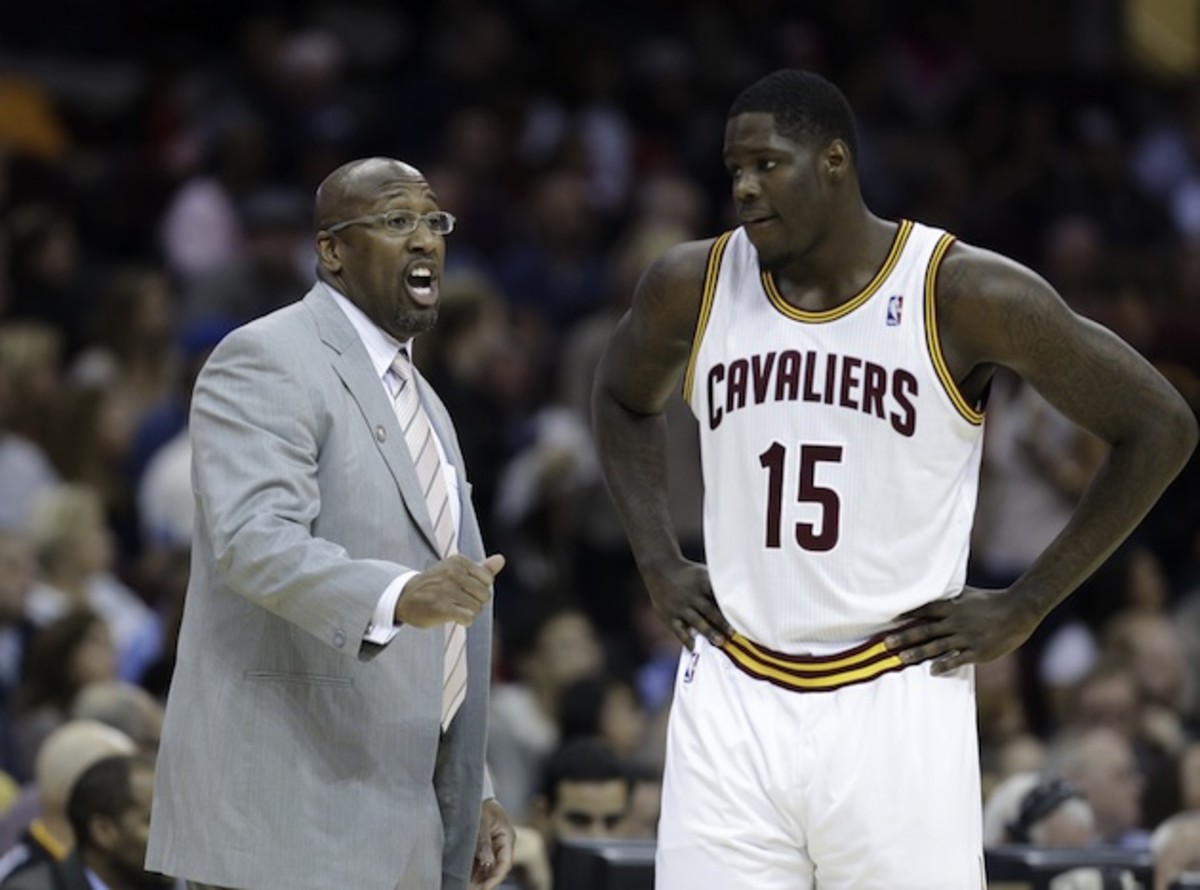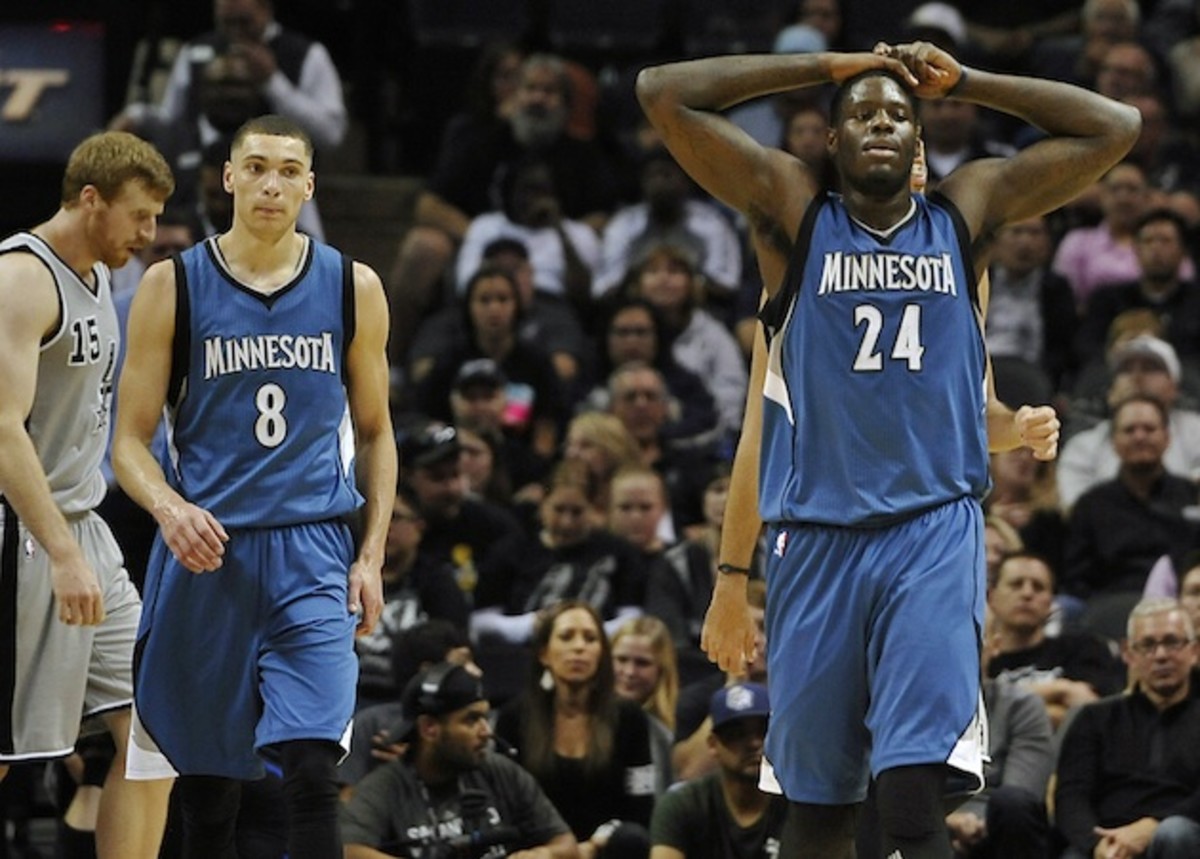Opportunity Lost: Anthony Bennett's strange career takes another turn

Anthony Bennett hasn’t reached the end of his NBA career, but he’s closing in on it with the rapidity of a late first-rounder, not a No. 1 pick. The Minnesota Timberwolves waived Bennett on Tuesday, in part because they have approximately 37 young forwards to whom they’d rather give playing time, but also because the power forward — who two short years ago was thriving at UNLV — has not looked at home on an NBA court. He seems to play scared, shuffling reluctantly into jumpers and double-clutching passes, and may be the slowest player in the league when it comes to decision-making. After two lackluster pro seasons (even that may be putting it graciously), the mind’s-eye image of Bennett is of him clutching the ball in the high post, just trying not to screw up.
That said, Bennett still has time to get himself right. He played pretty well for Team Canada this summer. Also, the Wolves weren’t fully functional last season, and the seeming bust-to-be might find new life under a coach more invested in his development and needs than Flip Saunders. That’s speculation, though. Surely, there’s a universe in which Bennett burns out at his next destination and spends 2017 playing for Besiktas. Then again, there’s yet another one in which he gains a bit of confidence and finds a role off the bench.
Can Anthony Bennett’s NBA career be saved after buyout with T-Wolves?
It’s rumored Bennett could end up with the Sixers, which would probably sign a wax statue if they thought they could flip it for a second-rounder down the road. Bennett shouldn’t even take a meeting with GM Sam Hinkie, lest he spend a lost season or two as someone else’s asset. He needs to be coached and guided. The Trail Blazers are sniffing around, too, and that move would make some sense. Portland is trying to get younger, and Bennett is a young basketball player. Additionally, the Pistons, Pacers, and Mavericks all have fine coaches and thin frontcourts, and could jump into the fray as training camp approaches.
But even if Bennett redeems himself on a new team in the next few years, his first two pro seasons are already set in stat-sheet stone — and there some anti-accomplishments to behold.
You’ve heard the one about how Derrick Williams has been a rather large disappointment, right? Over his first four seasons, the former No. 2 pick has amassed a true shooting percentage of 51.9, a not-so-encouraging uptick from the 50.9 he registered during his first two years. Bennett’s true shooting percentage after 109 NBA games: 44.4. According to Basketball Reference, Bennett’s shooting in his rookie and sophomore years puts him in a class with legendary busts like Adam Morrison, Ed O’Bannon, and Nikoloz Tskitishvili.

The only three-point-era players who’ve shot so poorly early in their careers and rebounded to have lengthy and somewhat productive NBA tenures have almost all been either 1) quasi-defensive stoppers like Corey Brewer, Chris Andersen, Lindsey Hunter, Jared Jeffries, and DeShawn Stevenson; or 2) assist-contributing point guards with dope names like Mookie Blaylock and Muggsy Bogues. There’s not a scoring forward in the bunch, presumably because if the thing you’re supposed to be contributing is buckets, you either convert them or get cast out of the league.
While Bennett’s abysmal shooting numbers place him in some ignominious company, perusing the PERs of some of the league’s most infamous flameouts reveals Bennett’s overall contribution to his teams has been even less impressive than most of his bustdom brethren. With a career PER of 9.5, Bennett’s first two years have been far worse than Michael Sweetney’s (16.6), Michael Beasley’s (16.6), Stromile Swift’s (15.5), Darius Miles’s (14.5), and Kwame Brown’s (12.9), and slightly lousier than Michael Olowokandi’s (10.9) and Hasheem Thabeet’s (10.5). On the bright side, Bennett edges out Jonathan Bender (7.6), who came into the NBA at 6-foot-11 and 202 pounds, and Darko Milicic (5.3), a delicate genius who was ruined by Larry Brown.
Even casual NBA observers understand that Anthony Bennett has had a historically miserably start to his NBA career. These numbers, however, lay out with mathematical specificity the extent of that miserableness. I’m not sure how many people have taken to defending Kwame Brown over the last decade, but apparently there was a time — specifically, at the conclusion of a second underwhelming season — when even he was more statistically promising than Bennett. Remember when Doug Collins was mumbling to himself about how the Kwame Project could have been going worse? Turns out he wasn’t lying.

What differentiates Bennett from his sadsack peers is that he wasn’t nearly as widely pegged for superstardom. He came into the league with Bill Simmons gasping on live television because no one thought the Cavs were serious about taking such a raw player with the first pick. (Not for nothing, Cleveland GM Chris Grant eventually lost his job.) In fact, Bennett was projected in most mock drafts to be selected toward the back end of the top 10, from a talent pool that was bemoaned at the time— rightfully, as it turns out — for being weak. After all the draft-night hullabaloo, Bennett spent his first NBA summer rehabbing a lingering shoulder injury, put on some weight, and made his NBA debut all but doomed to fail: an asthmatic, tentative wreck who took five games (FIVE!) to make his first basket. The poor performances and dazed looks persisted, and Bennett became a punchline in no time flat. Now Bennett more often evokes sadness.
• MORE: Chris Bosh values life after near-death experience
I have a confession to make. As a person who watches basketball and has a heart, I want Bennett to go away. Not because I want him to see him admit defeat or slink into a post-playing life wondering what could have been, but because — and I know this sounds selfish — it hurts to watch him. Fraudulent No. 1 pick or otherwise, he flashed a wealth of talent in college, and to see it abandon him, to see him use his body like it’s a car he’s forgotten how to drive, is unpleasant.

But Anthony Bennett will be around for a while yet. Guys drafted that high simply don’t wash out of the league so swiftly, no matter how mightily they struggle. There’s time for him to turn around his career. There’s also time for him to embarrass himself even further — a chance to tack a couple more staggeringly bad seasons onto what is already an awful basketball resume.
Opportunity isn’t always a blessing. When someone's failed as baroquely and repeatedly as Bennett has, every chance he's given—ostensibly to redeem himself—becomes easy to see as just another humiliation in the making. Because of his pedigree, Bennett will get a third chance, and it’s true his next stop could be one that results in a modest renaissance. Given his track record, though, it’s probably more likely to be tragicomic—50 games, maybe more, maybe less, of Bennett standing in the high post, hesitating, looking like he’s never going to stop screwing up.

